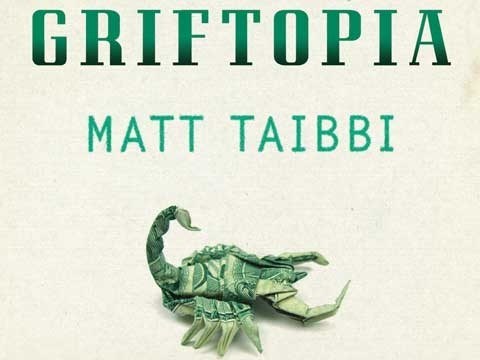America is a crackhead.
Addicted beyond hope, it is dragging its emaciated carcass to the pawn shop so it can feed its money habit just a little bit longer.
Only this crackhead isn't pawning its television or beer fridge. No, this one is getting its fix by selling off public assets like Chicago's parking meters and the Pennsylvania turnpike to oil sheikhs in the Middle East. It's a fire sale for America and everything must go!
This is, in short, the America that emerges in Matt Taibbi's Griftopia . It's a greedy, myopic place that, like a stubborn addict in rehab, refuses to deal with its addiction and drags everyone else down with its problems.
Taibbi, a columnist and feature writer with Rolling Stone magazine, has made a name for himself as one of the most effective chroniclers of the financial crisis. Where most business reporting bogs down in incomprehensible terms like Collateralized Debt Obligation, Credit Default Swap and FICO scores, Taibbi unravels such concepts in a way that the common reader can understand.
His root target in the book is greed and the incantations it has unleashed on American society. He takes aim at its beneficiaries in crude, hilarious language that makes a dense topic both enlightening and confounding.
Of Goldman Sachs, for example, he writes that the leviathan bank is a "great vampire squid wrapped around the face of humanity, relentlessly jamming its blood funnel into anything that smells like money." The bank, Taibbi writes, sold toxic investments to its clients and bought insurance against them in a kind of Ponzi scheme that essentially bet against its own clients.
The company had a profitable year amidst the crisis and Taibbi says that's because Goldman alumni were stationed in all the right places - at national banks, at influential positions in the White House, even at the Treasury, where one of its people served as Secretary when the bank got a bailout with all the rest.
Goldman Sachs is a primary target of the book but it is by no means alone. Taibbi devotes an entire chapter to Alan Greenspan, a former chair of the Federal Reserve who bitterly resisted attempts to regulate derivatives, financial instruments that packaged together mortgages, credit card debts and various other transactions that were assigned unrealistically high credit ratings, then broken up and sold to investors.
As Taibbi relates it, Greenspan was a corporate tool whose position as head of the reserve gave banks confidence they'd be taken care of, even if their investments went sour.
Less important to the crisis, but still prominent players, are the Tea Party, the alleged grassroots movement in the U.S. that's demanding a rollback on government spending and cancellation of health care reform. In Taibbi's estimation, the Tea Party is a mob of patsies doing the dirty work of Wall Street executives to obstruct any reform at the government level.
Griftopia, at its heart, is a cry out to America to get some help. Its author worries that his country is gripped by an insatiable thirst for money and won't do a thing to save itself. Taibbi offers no real solutions, but that's a tough thing to expect from a journalist. It should be enough for readers that he's one of the few with the will and the ability to tell you about the multitude of ways you're getting screwed.




